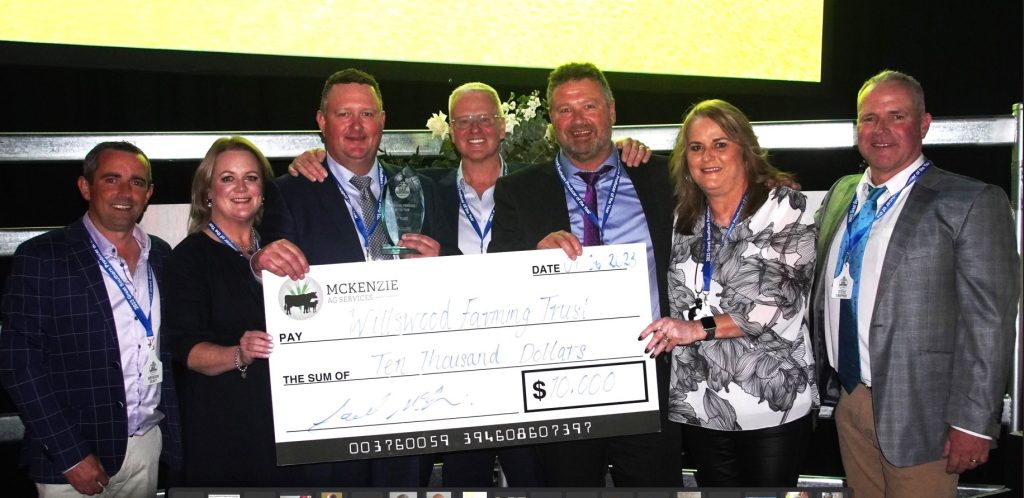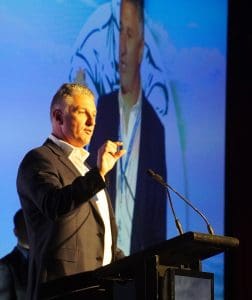
Willswood Farms’ Greg, Toni, Josie and Tim Williams accepting their award from JBS Southern division COO Sam McConnell, livestock manager Steve Chapman and buyer Brendon Geary during Friday night’s Great Southern ten-year anniversary celebration. Click on image to enlarge
HAVING a grazing property only 1.5km from the JBS Bordertown lamb processing plant provides distinct advantages for South Australia’s Willswood Farms, crowned JBS Australia’s Great Southern Lamb Producer of the Year on Friday.
Good all-round performance was the secret behind the win for the Williams family’s Willswood Farms business based around Mundulla, near Bordertown in South Australia’s southeast. The business turns off around 20,000 lambs each year, with about half of that dedicated to JBS’s farm-assured grassfed program.
The Lamb Supplier of the Year awards, last celebrated in 2018 prior to COVID, are based on a point-score system based on grading performance for yield and quality against MSA and company specifications, carcase weight and supply performance. The scores were weighted towards the more challenging seasonal supply quarters two and three.
Under the protocol, Willswood Farms scored an extraordinary 98.45 points out of a possible 100 to earn the Supplier of the Year crown.
Family members Greg, Toni, Josie and Tim Williams accepted their award from JBS Southern division chief operating officer Sam McConnell during Friday night’s Great Southern ten-year anniversary celebration gathering (see earlier report).
The event saw more than 500 JBS Great Southern lamb and beef suppliers from across Victoria, southern NSW, Tasmania and eastern regions of South Australia come together, along with key Great Southern meat customers, service providers and other stakeholders.
The Williams family operates a network of six breeding and growing properties, all within 30km of the JBS Bordertown plant. The closest, almost within sight of the plant’s livestock receival yards, meaning lambs are walked to the plant rather than trucked.
Not only does this unique opportunity have benefits in terms of stress mitigation, but provides savings on transport costs, and optimises carcase yield.
While the Williams family also buys weaner lambs out of the market each year, about 6000 are home-bred. The family predominantly turns off second-cross lambs out of first-cross ewes mated to either Dorset or White Suffolk rams, with Black Suffolk rams now being used over first cross ewe lambs. Merino ewes are bought in, and mated to Border Leicesters to produce the first cross.
Tim Williams said getting the lambs off at the right weight was one of the secrets to consistent supply and optimum returns under brand programs like Great Southern.
The family aims to turn virtually every lamb off at 55-60kg liveweight at anywhere from six to 12 months of age, relying heavily on auto-weigh scales and auto drafters. Almost all the sale lambs fall into the 24-26kg carcase range, in the sweet-spot on the JBS Great Southern grid.
“We watch weights very closely, weighing nearly weekly on the sale lambs,” Mr Williams said.
Being located so close to the JBS Bordertown plant means it is very easy for Willswood to market smaller mobs in tighter weight ranges, more frequently, to optimise the benefit.
“It’s not impossible for us to offload as few as 150-200 lambs at a time – and we often do – because we only have to walk them down. There’s no transport component to consider, and it often works to help Bordertown top-up its kill. As recently as last Sunday, we got a call saying there were two trucks bogged, and we were able to fill the gap,” Mr Williams said.
Most of the bought and home-bred lambs start off on lucerne-based pasture, and sold off pasture.
Pellet manufacturing venture
The family also operates its own stockfeed pellet manufacturing business, including developing pellets to comply with JBS’s farm-assured grassfed program.
From small beginnings as a drought mitigation tool, the Willswood Pellets stockfeed business has become an important cashflow extension for the family business in recent years.
Despite their success in this year’s Supplier of the Year awards, the Williams consider they are nowhere near their program’s potential yet.
“We need to do more with our ewes, more with our lambs, and better utilise our pellets and nutrition,” Mr Williams said.
Having listed to the Great Southern program conference presentations earlier in the day, their key take-home message was that it was going to be important to engage in the industry’s push towards sustainability, rather than sit back and leave it up to government or regulators.
Willswood Farms took home a $10,000 cheque from sponsor, McKenzie Ag Services for their Lamb Supplier of the Year win.
Runner-up in this year’s awards was Andrew McShane, Stockman Stud, Kempton, Tasmania, who received a $2500 voucher from Clipex with Charlie and Jo Koch, Tallageira Pastoral Co, Francis, South Australia third, receiving a $1250 RM Williams voucher provided by Pat Harrolds Transport.
This year’s Great Southern Producer of the Year results perhaps reflected the difficult seasonal conditions in parts of Victoria due to excessively wet conditions at times during the past year, with the majority of this year’s ‘Top ten’ placegetters in both beef land lamb originating from either Tasmania or South Australia.
Commitment to a quality program
Speaking during Friday night’s Great Southern awards dinner, JBS Southern chief operations officer Sam McConnell said the awards recognised the commitment of Great Southern and its top-performing producers to providing Australia with the highest quality red meat.
“Our goal is to guarantee customer confidence that our meat is responsibly sourced and sustainably produced from grassfed, free-range livestock across Southern Australia. This awards night is about recognising and rewarding our producers for sharing this goal and passion with us,” Mr McConnell said.
Staying true to an original strategy
JBS Australia chief executive Brent Eastwood told the gathering the Great Southern farm-assured lamb and beef program had stayed true to the original strategy developed twelve years ago.

JBS chief executive, Brent Eastwood
“It has not deviated since day one,” he said. “There have been trying times along the way where the P&L did not necessarily encourage such programs to continue, but we were committed; the team did not waiver.
“The best form of flattery is often others copying your ideas, and if you look around southern Australia today, many of JBS’s competitors have developed programs somewhat similar to Great Southern.”
“But ours is the first; we’re committed to it; and it’s the largest grassfed brand program of its type in the world, backed by high integrity and performance. But it takes many committed people – from producers all the way through to plant level – to make it all work.”
“So many of our suppliers have stayed with us all the way through, and can share in the pride in the program’s success.”
Mr Eastwood said one of his (and JBS Southern’s COO Sam McConnell’s) early mentors when working in the JBS US business advised them, “Put the right product in the right box, and ask the right price.”
“Over ten years with Great Southern, we’ve stuck to that mantra – don’t cut corners, or do anything that’s not true to the brand’s values and mission statement.”
Mr Eastwood said it was impossible to operate a program like Great Southern, if it was expected that revenue could be recovered from just a few premium cuts.
“Nearly all of the carcase has to be sold at a premium – that means when it is all aggregated back, we can hopefully pay more money for the lamb and beef suppliers who go to the trouble to produce it.”
JBS Southern head of lamb sales, Warren Swanson, attributed Great Southern’s popularity with consumers to the export and domestic markets’ increased expectation of transparency across the value chain and assured sustainable production.
“Our customers place utmost trust in the program’s guarantee, knowing they will consistently receive products of superior eating quality that were produced sustainably across all aspects of the value chain,” he said.

HAVE YOUR SAY